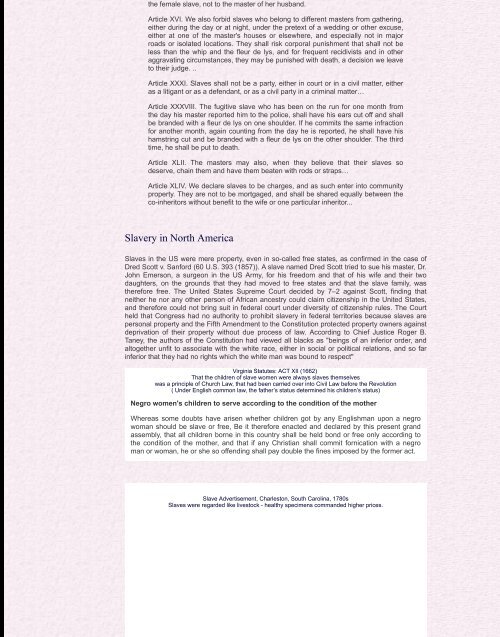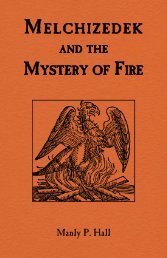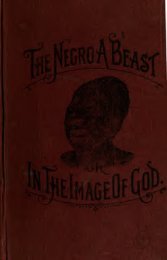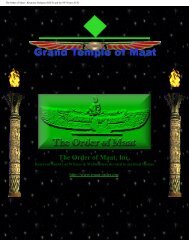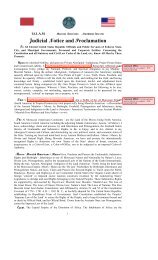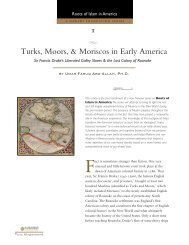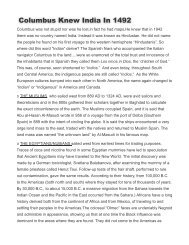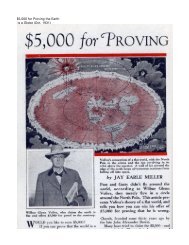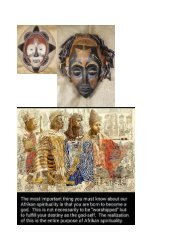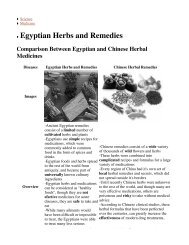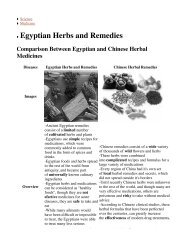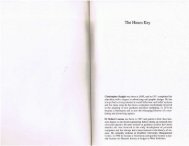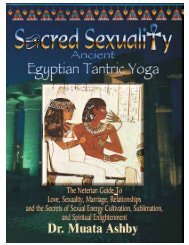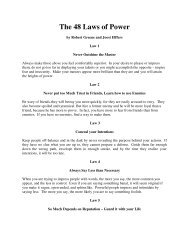Christian Slavery - Bad News About Christianity
Create successful ePaper yourself
Turn your PDF publications into a flip-book with our unique Google optimized e-Paper software.
the female slave, not to the master of her husband.<br />
Article XVI. We also forbid slaves who belong to different masters from gathering,<br />
either during the day or at night, under the pretext of a wedding or other excuse,<br />
either at one of the master's houses or elsewhere, and especially not in major<br />
roads or isolated locations. They shall risk corporal punishment that shall not be<br />
less than the whip and the fleur de lys, and for frequent recidivists and in other<br />
aggravating circumstances, they may be punished with death, a decision we leave<br />
to their judge. ..<br />
Article XXXI. Slaves shall not be a party, either in court or in a civil matter, either<br />
as a litigant or as a defendant, or as a civil party in a criminal matter…<br />
Article XXXVIII. The fugitive slave who has been on the run for one month from<br />
the day his master reported him to the police, shall have his ears cut off and shall<br />
be branded with a fleur de lys on one shoulder. If he commits the same infraction<br />
for another month, again counting from the day he is reported, he shall have his<br />
hamstring cut and be branded with a fleur de lys on the other shoulder. The third<br />
time, he shall be put to death.<br />
Article XLII. The masters may also, when they believe that their slaves so<br />
deserve, chain them and have them beaten with rods or straps…<br />
Article XLIV. We declare slaves to be charges, and as such enter into community<br />
property. They are not to be mortgaged, and shall be shared equally between the<br />
co-inheritors without benefit to the wife or one particular inheritor...<br />
<strong>Slavery</strong> in North America<br />
Slaves in the US were mere property, even in so-called free states, as confirmed in the case of<br />
Dred Scott v. Sanford (60 U.S. 393 (1857)). A slave named Dred Scott tried to sue his master, Dr.<br />
John Emerson, a surgeon in the US Army, for his freedom and that of his wife and their two<br />
daughters, on the grounds that they had moved to free states and that the slave family, was<br />
therefore free. The United States Supreme Court decided by 7–2 against Scott, finding that<br />
neither he nor any other person of African ancestry could claim citizenship in the United States,<br />
and therefore could not bring suit in federal court under diversity of citizenship rules. The Court<br />
held that Congress had no authority to prohibit slavery in federal territories because slaves are<br />
personal property and the Fifth Amendment to the Constitution protected property owners against<br />
deprivation of their property without due process of law. According to Chief Justice Roger B.<br />
Taney, the authors of the Constitution had viewed all blacks as "beings of an inferior order, and<br />
altogether unfit to associate with the white race, either in social or political relations, and so far<br />
inferior that they had no rights which the white man was bound to respect"<br />
Virginia Statutes: ACT XII (1662)<br />
That the children of slave women were always slaves themselves<br />
was a principle of Church Law, that had been carried over into Civil Law before the Revolution<br />
( Under English common law, the father’s status determined his children’s status)<br />
Negro women's children to serve according to the condition of the mother<br />
Whereas some doubts have arisen whether children got by any Englishman upon a negro<br />
woman should be slave or free, Be it therefore enacted and declared by this present grand<br />
assembly, that all children borne in this country shall be held bond or free only according to<br />
the condition of the mother, and that if any <strong>Christian</strong> shall commit fornication with a negro<br />
man or woman, he or she so offending shall pay double the fines imposed by the former act.<br />
Slave Advertisement, Charleston, South Carolina, 1780s<br />
Slaves were regarded like livestock - healthy specimens commanded higher prices.


